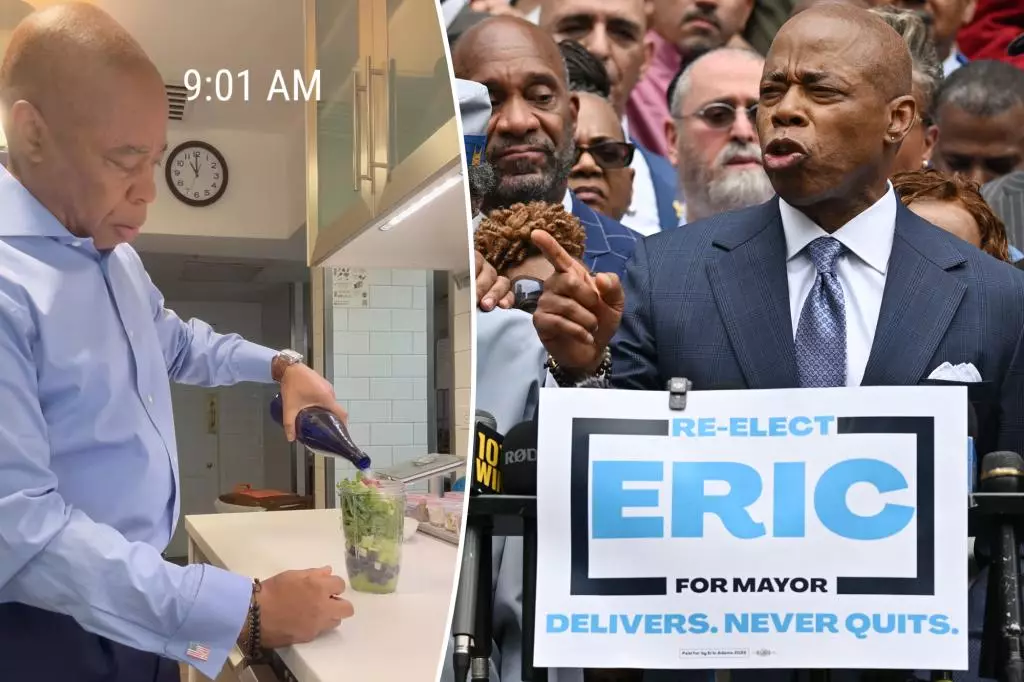In an era dominated by digital communication, Mayor Eric Adams of New York is boldly transforming the typical political persona into something far more modern and approachable. Rather than sticking to the conventional modes of political communication, Adams has embraced the strategies used by social media influencers to connect with constituents. His Instagram is punctuated by everyday moments—ironing his pants, making smoothies, or simply sharing his routine. These glimpses into his daily life break the long-standing barrier between elected officials and the public, turning political engagement into something more personal and genuine.
This approach signifies a new understanding of authenticity in politics. Adams does not shy away from showing his vulnerabilities or informal side, breaking free from the traditional image of a stiff, untouchable authority figure. His willingness to share things as mundane as ironing or smoking a cigar invites the public to see him as a real person with good and bad days, rather than just a political symbol. This resonates particularly well with younger voters who prioritize transparency and relatability over polished speeches and tightly controlled appearances.
Leveraging Social Media as a Political Tool
Importantly, Adams’ strategy is not just about image cultivation—it’s a calculated move to circumvent traditional media gatekeepers who might underreport or selectively cover his activities. By utilizing platforms like Instagram and YouTube streaming, the mayor controls the narrative directly, communicating unfiltered messages to the people. His candid comment, “If you want to hate the player, you better at least respect the game,” underscores a savvy understanding of modern media dynamics, where social platforms are no longer secondary but central to outreach efforts.
This digital-first campaign highlights a broader shift in political communication, where social media isn’t just supplementary but indispensable. Adams’ example illustrates how politicians can adapt to the changing media landscape by adopting more transparent, multifaceted online personas that can inspire trust and engagement. It also challenges the notion that politicians must maintain a strictly formal presence to be taken seriously. His innovative media strategy could set a precedent for other politicians who have been slow to evolve in the age of TikTok and Instagram.
Balancing Authenticity with Political Reality
While Adams’ social media efforts project authenticity, his openness doesn’t exempt him from grappling with serious political and legal challenges. The mayor openly addressed the federal bribery and corruption indictment he faced and highlighted the controversial pardon from former President Donald Trump. His assertion that he did nothing wrong, despite associates acting ‘inappropriately,’ reflects a complex reality that social media charisma alone can’t solve.
This dichotomy raises crucial questions about perception versus substance in modern politics. How does a politician maintain credibility when their authenticity is questioned against the backdrop of serious allegations? Adams’ candid approach may help humanize him, but it also puts his personal conduct and political decision-making under intense scrutiny. The answer seems to lie in a delicate balance: being open about one’s flaws and difficulties while demonstrating concrete leadership and ethical standards.
The Future of Political Branding in the Digital Age
Mayor Adams’ integration of social influencer tactics into political campaigning signals an important evolution in how leaders cultivate public support. His content—ranging from ‘Get Ready With Me’ style videos to casual day-in-the-life posts—might attract viewers who traditionally dismiss politics as dull or inaccessible. This phenomenon may encourage greater civic participation by breaking down formal barriers and inviting citizens into the personal world of their leaders.
However, the blend of entertainment and governance also comes with risks. Overemphasis on personality-driven content can sometimes overshadow critical policy discussions or allow image management to mask deeper issues. For Adams and politicians following his lead, the challenge will be to sustain this engagement without trivializing important topics or losing focus on the responsibilities of public office.
By embracing social media authentically, Eric Adams is pioneering a new model of political engagement—one that recognizes the power of transparency, creative communication, and direct connection with the electorate in an increasingly digital world. Whether this approach will translate into lasting political success remains to be seen, but it undeniably marks a significant shift in the texture of public leadership.

